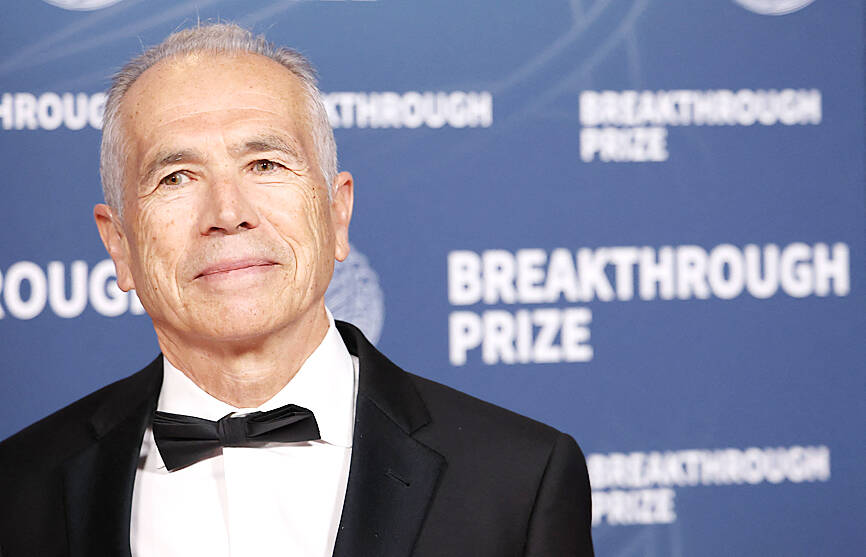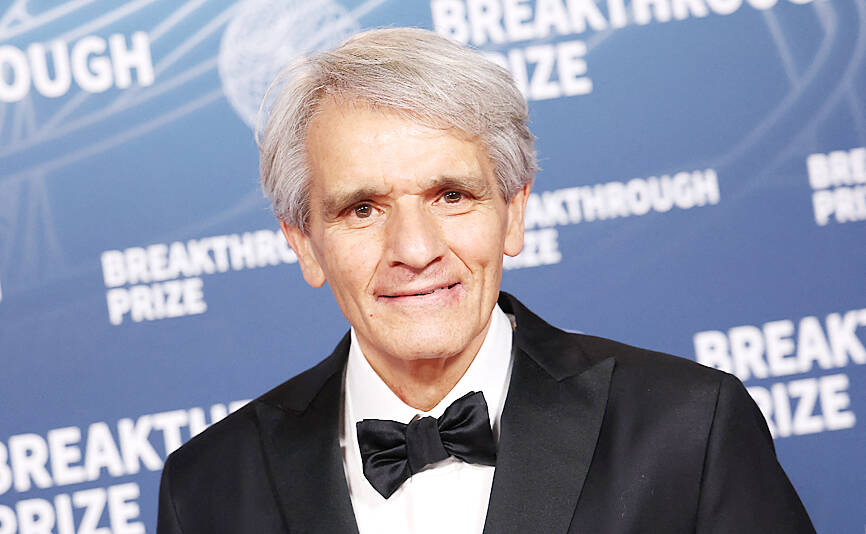An American neurologist and an Italian epidemiologist whose work revolutionized the treatment of multiple sclerosis (MS) on Saturday won a prestigious Breakthrough Prize, nicknamed the “Oscars of science.”
Stephen Hauser and Alberto Ascherio were recognized for their decades researching the debilitating neurodegenerative disease, which affects nearly 3 million people worldwide and was long considered an impenetrable enigma.
Hauser’s work on MS started more than 45 years ago, when he met Andrea, “an extraordinarily talented young woman who was already an attorney” and working at the White House under then-US president Jimmy Carter, he said.

Photo: AFP
“Then MS appeared in an explosive fashion and destroyed her life,” he said.
“I remember seeing her, unable to speak, paralyzed on the right side, unable to swallow and soon, unable to breathe on her own, and I remember thinking that this was the most unfair thing I had ever seen in medicine,” he said.
Then 27 years old, he decided to make it his life’s work.

Photo: AFP
“At the time, we had no treatments for MS. In fact, there was also a pessimism that treatments could ever be developed,” said Hauser, now 74 and director of the neuroscience institute at the University of California, San Francisco.
Scientists knew the disease, which damages the central nervous system and leads to paralyzing cognitive and motor problems, was caused by the immune system turning on the body.
However, they thought the white blood cells known as T cells were the lone culprit.
Studying the role played in the disease by B cells, another type of white blood cell, Hauser and his colleagues recreated the damage MS causes to the human nervous system in marmosets.
The US federal body overseeing medical research dismissed the link as “biologically implausible,” and turned down their application for funding for a clinical trial, but Hauser and his team pressed on.
They persuaded pharmaceutical company Genentech to back testing.
In 2006, they found that treatments targeting B cells were associated with “a dramatic, more than 90-percent reduction in brain inflammation,” Hauser said.
That threw open a door to bring new treatments to market that slow the advance of the disease in many people.
However, it raised other questions. For example, what would cause white blood cells to turn against the body?
That puzzled Ascherio, now a professor at Harvard University.
He investigated why MS mostly affected people in the northern hemisphere.
“The geographical distribution of MS was quite striking,” he said. “MS is very uncommon in tropical countries and near the equator.”
He and his team carried out a long-term study following millions of young US military recruits.
After nearly 20 years of research, they came up with an answer. In 2022, they confirmed a link between MS and the Epstein-Barr virus (EBV), a common infection responsible for another well-known disease, infectious mononucleosis, or mono.
“Most people infected with EBV will never develop MS,” but everyone who develops MS has had EBV first, Ascherio, 72, said.
The discovery did not explain why MS occurs, but it fueled hope of finding new treatments and preventive measures for a disease that remains incurable.
Ascherio’s breakthrough could also help treat other conditions.
“We are now trying also to extend our investigation, to investigate the role of viral infection in other neurodegenerative diseases, like Alzheimer’s or amyotrophic lateral sclerosis,” also known as ALS or Lou Gehrig’s disease, he said.
The link remains theoretical, but “there is some evidence,” he said.
“It’s like where we were on MS 20 or 30 years ago,” he added.

VAGUE: The criteria of the amnesty remain unclear, but it would cover political violence from 1999 to today, and those convicted of murder or drug trafficking would not qualify Venezuelan Acting President Delcy Rodriguez on Friday announced an amnesty bill that could lead to the release of hundreds of prisoners, including opposition leaders, journalists and human rights activists detained for political reasons. The measure had long been sought by the US-backed opposition. It is the latest concession Rodriguez has made since taking the reins of the country on Jan. 3 after the brazen seizure of then-Venezuelan president Nicolas Maduro. Rodriguez told a gathering of justices, magistrates, ministers, military brass and other government leaders that the ruling party-controlled Venezuelan National Assembly would take up the bill with urgency. Rodriguez also announced the shutdown

Civil society leaders and members of a left-wing coalition yesterday filed impeachment complaints against Philippine Vice President Sara Duterte, restarting a process sidelined by the Supreme Court last year. Both cases accuse Duterte of misusing public funds during her term as education secretary, while one revives allegations that she threatened to assassinate former ally Philippine President Ferdinand Marcos Jr. The filings come on the same day that a committee in the House of Representatives was to begin hearings into impeachment complaints against Marcos, accused of corruption tied to a spiraling scandal over bogus flood control projects. Under the constitution, an impeachment by the

Exiled Tibetans began a unique global election yesterday for a government representing a homeland many have never seen, as part of a democratic exercise voters say carries great weight. From red-robed Buddhist monks in the snowy Himalayas, to political exiles in megacities across South Asia, to refugees in Australia, Europe and North America, voting takes place in 27 countries — but not China. “Elections ... show that the struggle for Tibet’s freedom and independence continues from generation to generation,” said candidate Gyaltsen Chokye, 33, who is based in the Indian hill-town of Dharamsala, headquarters of the government-in-exile, the Central Tibetan Administration (CTA). It

A Virginia man having an affair with the family’s Brazilian au pair on Monday was found guilty of murdering his wife and another man that prosecutors say was lured to the house as a fall guy. Brendan Banfield, a former Internal Revenue Service law enforcement officer, told police he came across Joseph Ryan attacking his wife, Christine Banfield, with a knife on the morning of Feb. 24, 2023. He shot Ryan and then Juliana Magalhaes, the au pair, shot him, too, but officials argued in court that the story was too good to be true, telling jurors that Brendan Banfield set